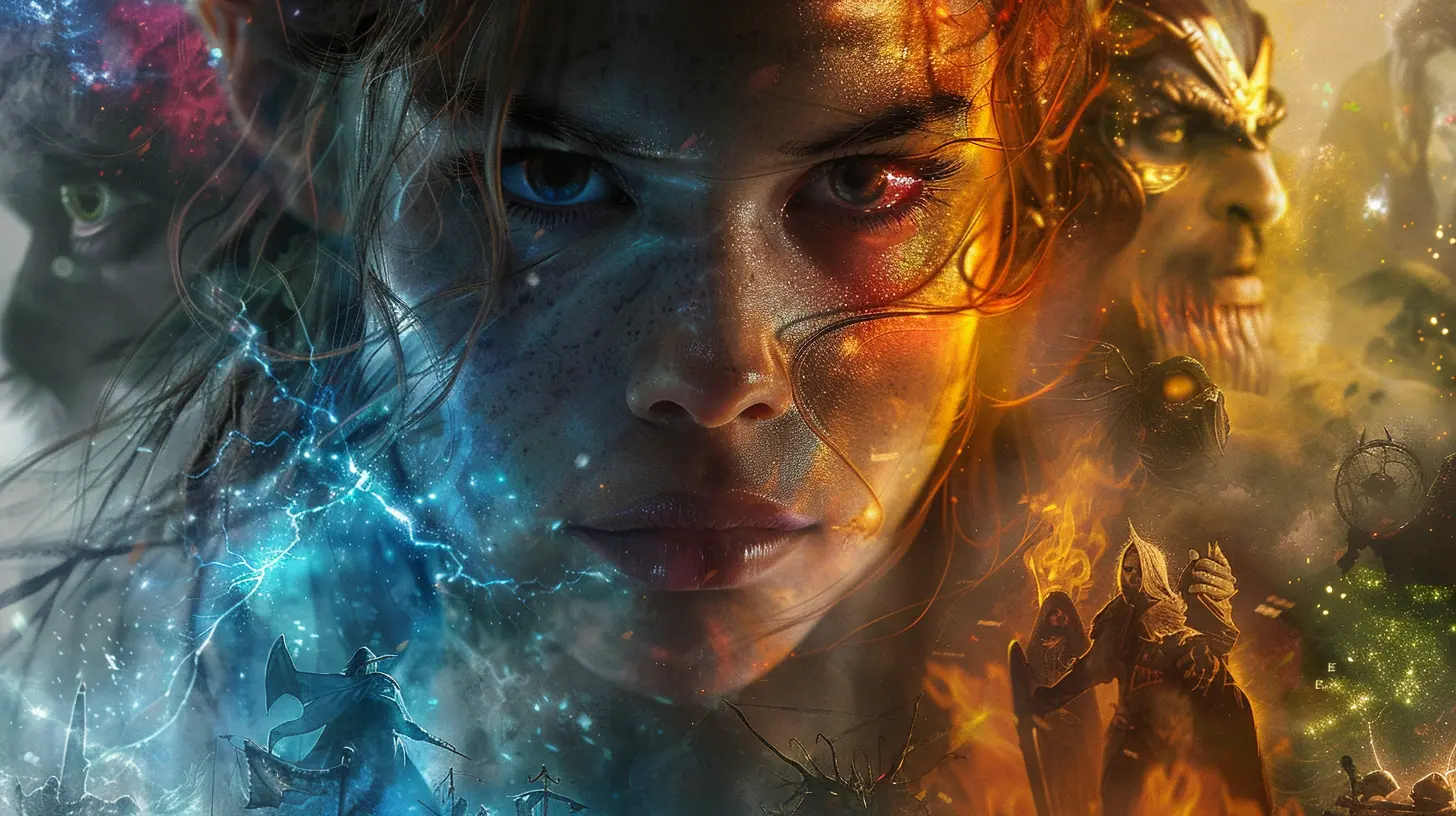Why Storytelling in Games Resonates with Players
5 November 2025
Let’s be real—have you ever played a game that made you laugh, cry, or completely rethink your existence? (I'm looking at you, Red Dead Redemption 2.) Yeah, same here. That’s the magic of storytelling in video games. It grabs you by the feels and doesn't let go.
Sure, graphics are slick, and gameplay mechanics can be tighter than your favorite pair of jeans after Thanksgiving. But the stories? They’re what keep us coming back for more. Whether it's saving your sister from an evil empire, making moral choices in the apocalypse, or simply building your dream life on an island with talking animals (ahem, Animal Crossing), storytelling is the secret sauce.
So, why does storytelling in games hit so hard? Pull up a chair, grab some snacks, and let’s jump into this pixelated rabbit hole together.
The Emotional Hook: Games That Make You Feel Stuff
Let’s start with the obvious—emotions. Good storytelling gets you emotionally invested. Games like The Last of Us, Life is Strange, or Undertale don’t just hand you a controller—they hand you a box of tissues.When we play a game with strong storytelling, we're not just completing quests and leveling up. We're experiencing joy, loss, betrayal, friendship, and sometimes, the warm fuzzy feeling of petting a virtual dog. (Seriously, every game should have a "pet the dog" button.)
That emotional depth is what makes a game unforgettable. You could forget how many headshots you got, but you’ll never forget when a beloved character died or sacrificed themselves for the greater good. Oof, right in the heart.
It’s All About Immersion, Baby
Imagine trying to enjoy a game where the plot is as dry as a mouthful of cinnamon. Not exactly engaging. But throw in a compelling story? Now we’re cooking.Storytelling turns games into immersive experiences. You’re not just playing as Geralt of Rivia. You are Geralt—monster-slaying, coin-collecting, sarcastic comment-making Witcher extraordinaire. A good story makes you forget you're sitting on a couch in your pajamas with a bag of Doritos. Instead, you're off saving the world—or destroying it, depending on your choices.
The narrative is what ties the gameplay together. It gives your actions meaning, even if that action is just delivering a pizza across a post-apocalyptic wasteland. (Yes, Death Stranding, we're still trying to figure you out.)
Player Choice: You’re the Star of the Show
Unlike movies or books, video games hand the reins (well, the controller) over to you. You’re not just watching a hero rise—you are the hero. And a big part of that experience is choice.Games like Mass Effect, The Witcher 3, Detroit: Become Human, and Telltale’s The Walking Dead give you options that actually matter. Your decisions affect the story, the characters, and sometimes, the world.
That level of agency? Chef's kiss. It turns the story into a collaboration between you and the game developers. You’re not just along for the ride—you’re driving the dang car.
And let’s be honest, who doesn’t love shouting “THAT’S NOT WHAT I MEANT!” when a dialogue option goes horribly sideways?
Character Development: The Heartbeat of Any Good Story
If the story is the skeleton, the characters are the bloodstream—the thing that keeps everything pumping. A strong character can carry an entire game. Sometimes even on their overly-muscular, clearly-not-skip-leg-day backs. (Looking at you again, Kratos.)Well-written characters help us connect to the narrative. Whether you’re guiding a young hero through a coming-of-age journey or watching a villain descend deeper into madness, a relatable character arc keeps players hooked.
And yes, even silent protagonists (Master Chief, we see you) can be iconic when surrounded by a rich cast of side characters who actually feel like real people.
When characters grow, struggle, fail, and triumph, we grow with them. It’s like being part of a really intense book club where you can actually swing a sword or cast fireballs.
The World-Building: More Than Just Pretty Pixels
Alright, we’ve covered the who and the what—now let’s talk about the where. Because let’s face it: a good story needs a great setting. Middle-earth wouldn’t be the same if Frodo was just chilling in a Starbucks, right?Games like Skyrim, Breath of the Wild, and Horizon Zero Dawn have worlds so rich you feel like you could book a vacation there. (Well, if deadly robots and dragons weren’t an issue.)
The lore, backstories, environmental storytelling—these all add texture to the narrative. A wall covered in cryptic writings. A journal found next to a skeleton. A ghost town with a tragic past. Sometimes, it's the little details that whisper the loudest story.
World-building gives the story layers, makes it feel lived-in. It’s what turns a game into a universe you want to keep exploring long after the main quest is done.
The Evolution of Gaming Storytelling: We’ve Come a Long Way
Remember when video game stories were basically “rescue the princess” or “stop the evil overlord”? Yeah, those were simpler times. Fun, sure, but not exactly emotionally complex.Now, we’ve got games that rival (and sometimes surpass) movies and books in terms of narrative sophistication. The lines between game developers and master storytellers have blurred—heck, some games are practically interactive films.
We’ve seen the rise of voice actors delivering Oscar-worthy performances, motion capture technology that captures every smirk and eye twitch, and scripts that could fill a small library.
Games like Disco Elysium, Nier: Automata, and Bioshock Infinite are so narratively rich, you'd need a philosophy degree and a few therapy sessions to fully unpack them. And we love them for it.
Multiplayer Storytelling: Yes, Even Online Games Have Feels
"But wait," you say, "What about online games? They don’t have story, do they?" Oh-ho-ho, my friend. Sit down.Even multiplayer games like Destiny 2, World of Warcraft, and even Fortnite (yeah, we said it) have evolved massive, ongoing storylines that keep players engaged. The lore in these games is deep enough to drown in.
And let’s not forget the stories we create with and through other players. Remember that one time your squad saved you from a surprise ambush in Apex Legends? Or when your guild took down a boss after months of tries in Final Fantasy XIV?
Digital friendships, rivalries, triumphs, betrayals—all of these become player-generated stories. And let’s be honest, those often become the most memorable parts of our gaming experience.
Indie Games: The Unsung Storytelling Heroes
Don’t sleep on the indies, folks. Just because a game doesn’t have a triple-A budget doesn’t mean it can’t deliver a narrative gut-punch.Games like Celeste, Hades, Oxenfree, To the Moon, and Spiritfarer prove you don’t need photorealistic graphics to tell a powerful story. These titles often tackle deep emotional themes—mental health, grief, identity—without ever feeling preachy.
Indie developers often take creative risks the big studios wouldn’t dare, and we, the players, are better off for it. Because sometimes, the best stories are the ones you never saw coming.
Storytelling in VR and AR: The Final Frontier
We couldn’t wrap up this discussion without touching on the new kids on the block—Virtual Reality and Augmented Reality. Storytelling in these formats is the next evolution, where you are inside the narrative, literally.Games like Half-Life: Alyx and The Walking Dead: Saints & Sinners are already turning heads with their immersive storytelling. As these technologies mature, expect stories that wrap around you like a cozy (or creepy) digital blanket.
Imagine looking a character in the eyes, hearing them whisper your name, and feeling like your every move matters. That’s not just a game—that’s a whole new storytelling dimension.
Wrapping It All Up: Stories Make Games Matter
At the end of the day, flashy sword fights and killer combos are fantastic. But it’s the narrative that gives all that chaos a reason. Storytelling turns pixels into people, quests into causes, and games into memories.Whether you’re a casual gamer who loves farming sims or a hardcore soulsborne masochist, the stories are what stick. They remind us why we play. To escape, to connect, to feel—sometimes all at once.
So next time you boot up your console, PC, or even your phone, take a moment to appreciate the story unfolding in front of you. Because behind every dragon, every explosion, every awkward romance subplot, there's a tale waiting to be told—and you’re the one living it.
all images in this post were generated using AI tools
Category:
Gamer LifestyleAuthor:

Brianna Reyes
Discussion
rate this article
1 comments
Wyatt Franco
Great article! 🎮 It's fascinating how storytelling in games creates such deep connections with players. The blend of immersive narratives and interactive experiences not only captivates our imagination but also allows us to explore emotions in ways other mediums can't. Can't wait to see more stories unfold in gaming!
November 12, 2025 at 3:55 PM

Brianna Reyes
Thank you! I’m glad you enjoyed the article. Gaming's unique storytelling really does create powerful emotional connections. Exciting times ahead for narrative in games!


